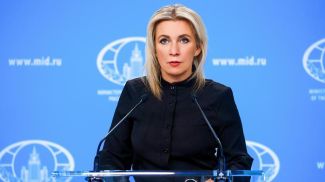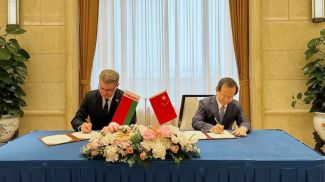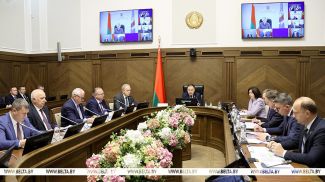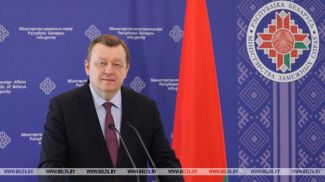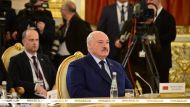The first China International Import Expo took place in Shanghai on 5-10 November. Belarus was among the participants of this large-scale forum. Speaking at the opening ceremony of the forum, President of the People's Republic of China Xi Jinping focused on China's plans to keep opening up. In an interview with the BelTA News Agency, Ambassador Extraordinary and Plenipotentiary of China to Belarus Cui Qiming unveiled the details of this opening-up strategy and shared plans to ramp up trade and economic cooperation with Belarus, which is China's strategically important partner.
The policy of reforms and openness was launched in China 40 years ago. In his keynote address at the expo, the Chinese leader basically declared a new stage of this policy…
At the opening ceremony, Xi Jinping delivered a report “New Era, Shared Future”. He reaffirmed China's commitment to greater openness and closer cooperation. He also explained what China was going to do to implement this policy.
Premier Li Keqiang also confirmed China's determination to double down on its efforts to promote openness, inclusiveness and mutually beneficial cooperation.
Over 40 years China has been consistently living up to its promise of greater openness that can benefit not only China, but also the entire world. In 1978 when this policy was launched, China's economy was estimated at CNY367.9 billion. In 2017 China's gross domestic product reached CNY82.71 trillion, which is equivalent to $12.2 trillion. China's share in global GDP rose from 1.8% in 1978 to 16% in 2017. These figures speak louder than words.
Over this time, China's GDP grew at the average rate of 9.5% annually, while the country turned into the world's second largest economy. Another important achievement is that China lifted out of poverty over 700 million people, which is a great achievement also in terms of human rights. Thanks to fast economic growth, our country achieved outstanding results in energy, transport, postal service and telecommunications, science, education, culture, health and other major sectors.
It is worth mentioning that starting from the 18th National Congress of the Communist Party of China led by Xi Jinping, the policy of reforms and openness advanced to a new strategic level setting the stage for even more impressive results.
What is the impact of China's policy of reforms and openness on the global economy?
I would say that this impact is tremendous. China's contribution to the global economic growth exceeded 30%. The amount of import and export skyrocketed nearly 800 times in 1978-2017. China remains the world's biggest commodity exporter accounting for 12.8% of the world's export. As far as commodity import is concerned, China is second only to the United States of America. China's FDI exceeded $196 billion in 2016, or over 10% of the world's FDI, making China the world's second largest investor.
In fact, our contribution to international trade is not limited to the increased trade volume. The modernization of the Chinese economy has a positive impact, too. According to statistics, in 2013-2016 China posted the biggest share of end consumption in the world.
While China is building up its economic capacity, it is also taking an active part in economic development and economic management, penetrating new markets, maintain mutually beneficial cooperation and increasing its openness. A case in point is the Belt and Road Initiative. At present over 100 countries and international organizations actively support this project and take part in it. The principle underpinning this project is “joint consultations, joint construction and joint use”. This project has become an important addition to the existing mechanism of global economic growth.
The pace of China's economic growth is still among the highest in the world…
The Chinese economy has stabilized. Major indicators, like economic growth, employment, prices, balance of payments, corporate profit, financial revenues and labor efficiency are within a reasonable range.
Despite increasing domestic and external uncertainty, the major principles underpinning economic development and stability remain unchanged, as Xi Jinping noted. Everything is in place in China for sustainable growth and long-term stability.
China has a population of over 1.3 billion and an area of over 9.6 million square kilometers. The country's economic growth prospects are encouraging. Emerging issues are tackled in time. According to international experts, China is constantly strengthening its macro-regulation capacity. We see that China is stepping up cooperation in investment and trade with the countries along the Belt and Road, including Belarus.
Can we say that the first China International Import Expo in Shanghai was part and parcel of the efforts to promote the openness policy?
Absolutely. The success of this forum is another step towards the implementation of the openness policy.
Looking back into the past, we realize that open cooperation beefs up viability of global economy and trade. Looking into the future, we can say with confidence that open cooperation is an imperative of our time.
The first China International Import Expo has captured the zeitgeist and is designed to create a common platform for promoting global trade and to offer international benefits for the promotion of the open economy. Naturally, the expo became a powerful instrument to protect the multilateral trade system.
In his keynote speech Xi Jinping mentioned five key areas to expand China's openness.
The Chinese leader pledged to stimulate the potential for increased imports, to continue to broaden market access, to foster a world-class business environment, to explore new horizons of opening-up and to promote international cooperation at multilateral and bilateral levels. This is a clear signal to the international business community.
In the coming 15 years, China's import of goods and services is expected to exceed $30 trillion and $10 trillion respectively. This opens up great opportunities to all China's partners, including Belarus that can boost supplies to the Chinese market.
This expo drew a lot of attention. How many countries took part in it?
Indeed, the first China International Import Expo resonated well with the international community. Attending the event were 172 countries, regions and international organizations, more than 3,600 companies, and more than 400,000 Chinese and foreign buyers, including Belarusian companies. The amount of contracts has yet to be announced, but reports suggest that they can be as big as dozens of billions of yuans. The results of this expo promise to be very impressive.
What is your take on Belarus' participation in this forum?
It is very important that Belarus arranged a national exposition at the expo. The level of presentation of the country's goods and services was high. Belarus and China signed a number of documents, including the agreement to set up a Chengdu-European industrial subpark in the China-Belarus Industrial Park Great Stone. The Great Stone park also signed a memorandum on trade and economic cooperation with the pilot area for China-SCO regional trade and economic cooperation.
I would like to emphasize the important results of the third meeting of the Belarusian-Chinese intergovernmental cooperation committee in Beijing chaired by Nikolai Snopkov, Deputy Head of the Belarus President Administration, and Guo Shengkun, member of the Political Bureau of the Communist Party of China (CPC) Central Committee and head of the Commission for Political and Legal Affairs of the CPC Central Committee. The parties signed a protocol of the meeting and cooperation documents.
The parties were unanimous about the need to ramp up efforts to implement the agreements reached by the two heads of state and to expand cooperation as part of the Belt and Road Initiative. They also agreed to keep exploring new cooperation opportunities in various sectors, to expand cooperation in economy, trade, high technology, education and culture.
Given strategic leadership and personal support of President of the People's Republic of China Xi Jinping and President of Belarus Alexander Lukashenko, our relations have advanced to a new level of trust and mutually beneficial cooperation, while the exchange of visits and interaction in various sectors have never been as good as today.
I am convinced that Belarus and China will be able to make the most of the colossal potential of the bilateral cooperation.
Alina Grishkevich, BelTA




